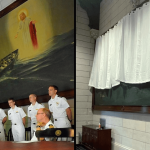 Nations that face peril need revival from the bottom to the top, but must include the wisdom of the elite. Our leadership class must look for answers that fit the beliefs of the people and not just turn to esoteric ideas that fit an international educated class. Simultaneously, to avoid destruction, we must glean the wisdom of our academic aristocrats.
Nations that face peril need revival from the bottom to the top, but must include the wisdom of the elite. Our leadership class must look for answers that fit the beliefs of the people and not just turn to esoteric ideas that fit an international educated class. Simultaneously, to avoid destruction, we must glean the wisdom of our academic aristocrats.
This is hard. Too often the elite and the folk are insulated from each other and learn to despise the wisdom that comes from different experiences of reality. We assume our help is in the prols . . . it is not . . . or some ideology will save us. . . it will not.
We face that danger today as our university culture is international and almost entirely cut off from the folks it serves. Schools like the University of Texas are more like University of California than they are like Texas. My alma mater, the University of Rochester, has more in common with both schools than the folk of Monroe County.
As a result our leadership, now drawn more from the college class than the military or business, may look for solutions to cultural decay outside of the life of the nation. We are, for example, overwhelmingly religious and Christian. Seventy-one percent of Americans identify as Christian and there are few other descriptions, ideas, or institutions that draw such support. In 2015, sixty-one percent of Americans under thirty self-identified as Christians. Find a cultural icon with that much young adult support!
Read about the death of a nation, such as Poland in the nineteenth century or Russia in the twentieth, and some modern historians tacitly will commend the outside forces of secularism in a nation and condemn the forces of “reaction.” Urban culture in Warsaw or Saint Petersburg is familiar and even hedonism seems better than “puritanical” religion. The difficulty is that both Poland and Russia failed to reform and the results were horrific for both peoples. The Poles spend centuries being dominated by foreign powers (including Russia) while the Russians spent decades committing suicide, murdering millions of her own people under atheism. Nations that escaped this fate, like Great Britain, often found solutions in leaders like John Wesley who renewed, changed, and revolutionized the establishment.
Poland had important streams of Catholic renewal in education, but these faced competition in the elite from secularism and in the populace from thoughtless reaction. The result was impotence in Poland. Historians also ignore the reforming zeal in the Orthodox Church of Russia before 1917. Just as the Constitution of 1905 gave Russia hope of a constitutional monarchy, so these reforms promised an Orthodoxy that was more international, less controlled by the state, and in service to the people. The language of the liturgy might have changed, a patriarch was coming (giving some autonomy from the state), and Russia might have been renewed as Great Britain was renewed.
Sadly, the elites of Russia became enamored with socialism (there were “red” princes!) and the colleges spawned bloody tyrants like Lenin. These were not workers, in touch with workers, but university elites out of touch with Russia. They gained power through promises and a deal of luck (bad for Russia, good for the tyrants) and proceeded to destroy indigenous cultures in many nations in the old Russian Empire.
In the Age of Trump, there is a tendency in my circles to look to academia for solutions, but academia, for all her many virtues, is incapable of leading at this moment. We are not in touch with our regions, having become too generic. We hear too many of the same voices and do not invite ideological criticism.
The great mistake would be to look to the “folk” for some sort of intrinsic wisdom and ignore education, high culture, and the university. This produces a cultural revolution which whether from atheism (China and Cambodia) or religion (Iran) ends up ugly.
We must respect science, high standards in discourse, reason, and the fruit of academic study. At the same time, we must acknowledge that much of what passes for education in the university has become brutal ideology disconnected from reason, evidence, and argument. All enclosed worlds are dangerous, including my own!
In America, the best solution would include an end to prosperity gospel and televangelist culture. We need a renewal of serious Evangelical, Catholic, and Orthodox Christianity: pure secularism cannot unite this nation. The signs are there in the works of great men like Russell Moore, a Baptist, The Fellowship of Saint James and Touchstone Magazine, and the ideas of Orthodox writer Rod Dreher. One need not agree with any of their proposed solutions, and they do not even agree with each other, to see the seeds of a serious American response to cultural decay.
These are serious people intellectually and they also care and are accountable to the opinions of the people in the pews. There is hope if we look that way. If we look to international secularism, then we will have a last president, like the last Polish king, or as is more likely, a tyrant from either the revolutionary right or left.
God save us.















